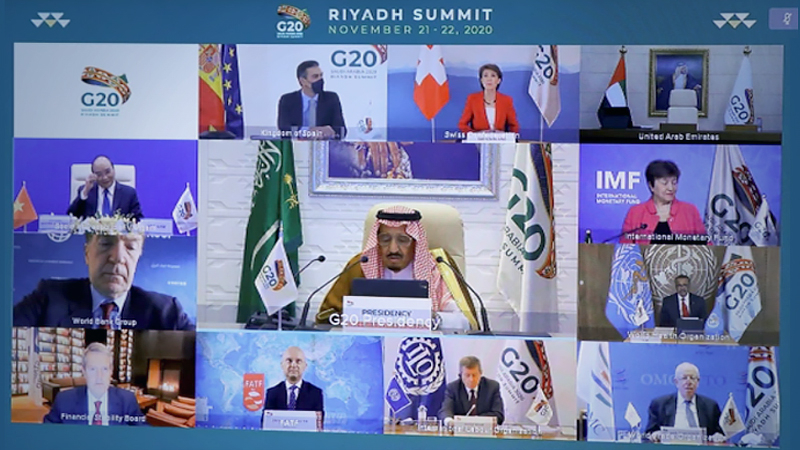Pandemic casts economic shadows on virtual G-20 summit

BEIRUT - Leaders from the Group of 20 nations urged for greater global cooperation Saturday to ensure coronavirus vaccines reach beyond the wealthiest regions, drawing clear contrasts with the Trump administration's break with the World Health Organization.
The comments also struck at questions over whether U.S.-made vaccines would become widely available beyond commercial deals once President-elect Joe Biden takes office and possibly restores ties with the WHO - even as the United States struggles with the world's highest death toll from the coronavirus.
With leaders connecting by video link - and Saudi Arabia as the host - attention quickly turned to vaccines as promising results from U.S.-based labs Pfizer and Moderna raise hopes of additional weapons soon against the pandemic, with China and Russia already planning expansion beyond trials of their vaccines.
In brief comments to the group, President Donald Trump said the United States has "marshaled every resource" against the coronavirus and noted the "record-setting speed" to develop vaccines and other therapies, according to a White House summary of the remarks.
He made no pledges, however, on expanding the availability of U.S. vaccines.
Chinese President Xi Jinping China was "willing to strengthen cooperation" with other countries to accelerate vaccine development and distribution.
"We will fulfill our commitments, offer help and support to other developing countries, and work hard to make vaccines a public good that citizens of all countries can use and can afford," Xi said.
China has opened trials for several state-backed vaccines in nations from Southeast Asia to Latin America. It also has become a leading backer of international vaccine collaborations such as Covax, a WHO-linked effort to expand vaccine distribution in the developing world. Trump had refused to join Covax as his administration pulls away from the United Nation's public health agency.
Pfizer and Moderna have focused on eventual domestic distribution under the Trump administration's Operation Warp Speed program. The European Union and other wealthy allies have cut separate deals for supplies of vaccines from Moderna and Pfizer, which has teamed up with Germany-based BioNTech.
Russian President Vladimir Putin said his country is ready to share its vaccines for "humanitarian considerations," warning that the pandemic is battering the global economy and raising risks of "mass, long-term unemployment and the accompanying rise in poverty and social dislocation."
"And the role of the G-20 is to ensure this doesn't happen," said Putin, according to the Kremlin translation of his remarks.
Turkey's President, Recep Tayyip Erdogan, told the meeting that the G-20 should endorse "affordable and fair distribution of covid-19 vaccine for everyone." Similar messages were shared by Canadian Prime Minister Justin Trudeau and South African President Cyril Ramaphosa, who said all nations should have "equitable and affordable access" to a vaccine.
Expectations remain low that the two-day summit will produce significant results in its toned-down setting for issues such as global economic crises and climate change. Members are expected to finalize a framework for providing poorer nations with debt relief and vaccine initiatives such as Covax.
The gathering brought backlash from Saudi and international human rights groups - as well as some U.S. and European lawmakers - calling on world leaders to boycott or downgrade their representation over the kingdom's abuses, including jailings of female activists and the killing of Washington Post contributor Jamal Khashoggi at the Saudi Consulate in Istanbul in 2018.
For Trump, the meetings marked another closing lap on the world stage before handing power to the Biden administration in January.After attending some of the virtual summit from the White House, Trump left to go golfing.
In his opening remarks, Saudi Arabia's King Salman spoke to a screen of international leaders, including Trump, and highlighted the economic support G-20 members had contributed to combating the coronavirus pandemic and economic fallout. He urged the G-20 to forge a collective path forward.
"In the near future, we must address the vulnerabilities exposed by covid-19 by working to protect lives and livelihoods," said the 84-year-old monarch, who spoke slowly in a raspy voice.
To the king's right was Crown Prince Mohammed bin Salman, the kingdom's de facto ruler, who has sought to reform Saudi's economy and society alongside a years-long crackdown on dissent that has brought him increased scrutiny and criticism.
Saudi Arabia had hoped for an in-person Riyadh summit, but in September announced it would be held virtually because of the coronavirus.
It was initially unclear whether Trump would attend, but he announced Friday he would.
In a statement Friday, European Commission President Ursula von der Leyen said she planned to push members to continue to provide pandemic-related economic support until recovery from the virus is certain.
She also expressed hope that the United States' "new President-elect" Joe Biden will "increase multilateral cooperation" in areas such as health and climate change, noting that until now "the United States has resisted engaging," in a rebuke of Trump's isolationist policies.
On Friday, U.N. Secretary General António Guterres said that $28 billion remains needed to fund the manufacturing and distribution of coronavirus vaccines. While G-20 members previously agreed to suspend debt payments for the world's poorest nations through mid-2021, he also urged them to extend relief until the year's end so that governments could prioritize tackling the virus and economic fallouts.
Italy, who takes over the presidency next in 2021, has said debt relief for Africa will be among its priorities.
The Group of 20 nations, who produce about 85% of global economic output, include countries with among the highest coronavirus cases, led by the United States.
Trump is one of three leaders attending the summit who have had confirmed cases of the coronavirus, along with British Prime Minister Boris Johnson and Brazilian President Jair Bolsonaro.Johnson, who in April required intensive care after catching the virus, is in quarantine after recent exposure to someone who tested positive for the virus.





